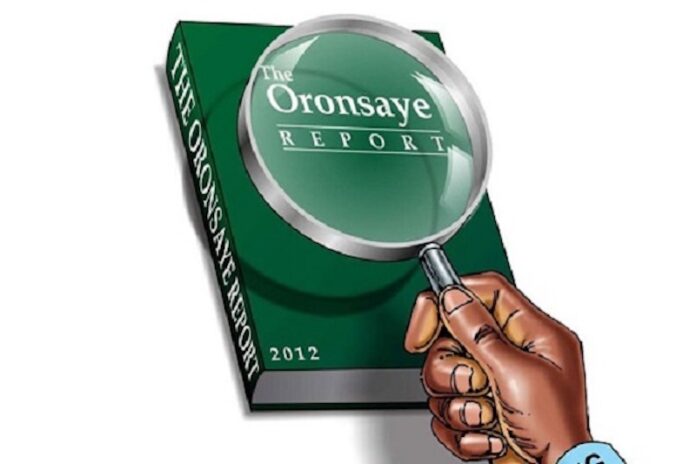•Tinubu constitutes Akume-led committee with 12-week ultimatum to ensure actualisation of approvals
•Agencies, departments merged, subsumed, scrapped include NACA, NEMA, NASENI, NEPC, Nomadic Education Commission, SERVICOM, NDPHC, ICRC, VON
•Govt says exercise will not translate to job losses
•To pay youth unemployment benefits, sets up consumer credit programme
In an apparent move to calm rising tempers and try to reassure citizens that the administration is also in belt-tightening mode amid widespread hardship, the Federal Executive Council (FEC), yesterday, approved the implementation of the Oronsaye Report. Minister of Information and National Orientation, Mohammed Idris, disclosed this while briefing reporters at the end of the FEC meeting at State House, Abuja, chaired by President Bola Tinubu.
The Oronsaye report principally recommends strategies for cutting down the cost of governance.
Idris said the adoption of the report, which was submitted to federal government in 2012, meant that some agencies, commissions, and departments of government would be scrapped or merged, and some would be moved to new ministries for better performance.
Equally briefing newsmen, Special Adviser to the President on Policy and Coordination, Hajia Hadiza Bala Usman, said Tinubu had set up a committee headed by Secretary to the Government of the Federation (SGF), Senator George Akume, to ensure that the approved mergers were concluded within 12 weeks.
Minister of Finance and Coordinating Minister of the Economy, Wale Edun, disclosed that the president had directed the design of a social security scheme for unemployed youths.
Idris said the latest action on the Oronsaye report was consistent with Tinubu’s courage to do the right thing for Nigeria.
The minister stated, “There is a landmark decision that was taken by FEC today. Recall that in 2012, the administration of former President Goodluck Ebele Jonathan instituted the so-called Oronsaye Report. It is aimed at rationalising the federal government parastatals, agencies, and commissions.
“Now, a paper was turned in in 2012, but the implementation got stalled. Again, in 2021, almost seven years after that, the former President Muhammadu Buhari also initiated a process to consider the 2014 white paper on the Oronsaye Report. Again, the implementation of that also got stalled.
“Now, instead of the rationalisation, that the Oronsaye Report was aimed to achieve, many other agencies and commissions were established.
“So in a very bold move today, this administration, under the leadership of President Bola Tinubu, consistent again with his courage to take very far-reaching decisions in the interest of Nigerians, has taken a decision to implement the so-called Oronsaye Report.”
Idris explained the implication of the decision to implement the report, saying, “Now, what that means is that a number of agencies, commissions, and some departments have actually been scrapped, some have been merged, while others have been subsumed. Others, of course, have also been moved from some ministries to others where government feels they will operate better.
“Like I said, those scrapped include the Pension Transition Arrangement Directorate, the National Senior Secondary School Education Commission is also being looked at with the aim to modify some of its processes and a final decision on that will be taken.
“Now, at the end of this exercise, we’re going to give you a clean copy of all those agencies that have been scrapped, modified, subsumed or moved to other ministries.
“Like I said, this is a very far-reaching decision. It is aimed, one, to fine-tune and to restructure government operations as a whole. Second, in line also with the vision of President Bola Tinubu to reduce the cost of governance, some of these agencies, you will discover and as you know, are performing almost very similar functions. So government thought it wise that there is the need, since this committee had already been set up, white paper already been produced, to take a bold decision to visit that. That has been done fully today.”
Speaking also, Usman said, “Mr. President constituted a committee that will work within a 12-week period to ensure that the necessary restructuring and legislative amendments that are needed to ensure that full actualisation of these approvals was granted. He tasked this committee with an immediate terms of reference to proceed and ensure all of these are done within a period of 12 weeks.
“The committee membership comprise the following: the Secretary to the Government of Federation will chair the committee; the Head of Civil Service of the Federation, member; the Attorney-General of the Federation and Minister of Justice, member; the Minister of Budget and National Planning, member; the Director-General, Bureau of Public Service Reform, member; the Special Adviser to the President on Policy and Coordination is a member; the two Senior Special Assistant to the President on National Assembly are members; and the Cabinet Affairs Office will serve as secretariat.
“The committee will look at the administrative restructuring and also the legislative amendments required to ensure the full implementation of the recommendations.”
Usman also stated, “There are other aspects of recommendations that have also been passed to the committee to look at. It’s important for us to appreciate the bold approval granted by Mr. President at the Federal Executive Council.
“This has been a recommendation that has been, I think, in the Nigerian discourse from 2012 and we’re here in 2024 and it’s so been approved and the aspects that are applicable to mergers, as I said, subsuming, scrapping and relocation of agencies are those that have been so considered, arising from the totality of the panel report.”
Usman listed some of the agencies, departments and parastatals affected by the merger and subsuming into other ministries.
She said, “We’ll go through quickly the list of agencies that have been so earmarked to be scrapped and their functions moved to ministries and agencies and those merged those to be subsumed.
“For agencies that are required to be merged, I’ll take it: National Agency for Control of HIV/AIDS (NACA) to be merged with the Centre for Disease Control in the Federal Ministry of Health.
“National Emergency Management Agency (NEMA) to be merged with the National Commission for Refugee Migration and Internally Displaced Persons; the Directorate of Technical Cooperation in Africa to be merged with Directorate of Technical Aid and to function as a department in the Ministry of Foreign Affairs.
“Infrastructure Concession Regulatory Commission to be merged with the Bureau for Public Enterprises; Nigerian Investment Promotion Commission to be merged with the Nigerian Export Promotion Council; National Agency for Science and Engineering Infrastructure to be merged with National Centre for Agriculture Mechanisation and Project Development Institute.
“The National Biotechnology Development Agency to be merged with the National Centre for Genetic Resource and Biotechnology; the National Institute for Leather Science Technology to be merged with the National Institute for Chemical Technology; the Nomadic Education Commission to be merged with the National Commission for Mass Literacy, Adult Education and Non-formal Education.
“The Federal Radio Corporation to be merged with the Voice of Nigeria; the National Commission for Museum and Monuments to be merged with the National Gallery of Arts; the National Theatre to be merged with the National Troupe of Nigeria; the National Metrological Development Centre to be merged with the National Metrological Training Institute.
“The Nigerian Army University, Biu, to be merged with the Nigerian Defence Academy, to function as a faculty within the Nigerian Defence Academy; Air Force Institute of Technology also to be merged with the Nigerian Defence Academy, to function as a faculty of Nigerian Defence Academy.”
Usman said regarding agencies to be subsumed, “The Service Compact with Nigeria (SERVICOM) to be subsumed to function as a department under the Bureau for Public Service Reform; the Border Communities Development Agency to be subsumed to function as a department under the National Boundary Commission. The National Salaries Income and Wages Commission to be subsumed into the Revenue Mobilisation and Fiscal Allocation Commission.
“The Institute for Peace and Conflict Resolution to be subsumed under the Institute for International Affairs; the Public Complaints Commission to be subsumed under the National Human Rights Commission, the Nigerian Institute for Trypanosomiasis to be subsumed into the Institute for Veterinary Research; the National Medicine Development Agency to be subsumed under the National Institute for Pharmaceutical Research and Development. The National Intelligence Agency Pension Commission to be subsumed under the Nigerian Pension Commission.”
The special adviser to the president on policy and coordination also stated, “For agencies to be relocated, the Niger Delta Power Holding Company to be relocated to the Ministry of Power; the National Agricultural Land Development Agency to be relocated to the Federal Ministry of Agriculture and Food Security; the National Blood Service Commission to be converted into an agency and relocated to the Federal Ministry of Health; the Nigerian Diaspora Commission to be converted into an agency and to be relocated to the Federal Ministry of Finance.”
Edun disclosed that the president had directed the design of a social security unemployment programme aimed at providing an economic lifeline to the unemployed.
He stated, “At this period of heightened food prices, Mr. President has committed to doing all that can be done to assist in giving purchasing power to the poorest and in that line, he has committed and instructed that the social security unemployment programme be devised, particularly to cater for the youth, for the unemployed graduates, as well as the society as a whole.
“So, we have coming, in the nearest future, an unemployment benefit for the young unemployed, in particular.”
Similarly, Edun said there would be a consumer credit scheme to alleviate the pains of the current economic reforms.
He explained, “Finally, all in the same line, to emphasise that there is empathy. And there is feeling for those who are less well off, or feeling particularly the pains of this adjustment, there is coming a social consumer credit programme.
“So, by making consumer credit available, of course, goods become more affordable, the economy even gets a chance to revive faster, because people have purchasing power that allows them to order goods, products.”
Edun also spoke on the review carried out by the special presidential panel on the National Social Investment Programme (NSIP), which has submitted a preliminary report to the president.
He said the president gave the highlights of the report to the council meeting, stating that what was done was “a review of the existing mechanisms, a review of the existing programmes, and where there have been successes, such as the 400,000 beneficiaries of the Geep programme, and so on and so forth.
“Those have been identified and recognised. School feeding programme is another example of relative success. And whilst there is still some further work to be done, particularly, as regards availability of the financial data, which is still being looked at, the interim report has been submitted and a key recommendation of the panel was that, especially given the heightened, limited household purchasing power at this time, rising prices, particularly elevated food prices, it’s important to restart the programme.
“So, the direct payments to 12 million households, comprising 60 million Nigerians, is to resume immediately with the important proviso that every beneficiary will be identified by their national identity number and the bank verification number.
“Therefore, payments will be made into bank accounts or mobile money wallets. So, whether it is before or after, there is verification of the identity of beneficiaries.
“Each person that receives 25,000 Naira for a total of three months will be identifiable, even after they have received the money, it will be clear who it went to and when it went to them. And that is the big change that has allowed Mr. President to approve the restart of the direct payments to beneficiaries programme.”























